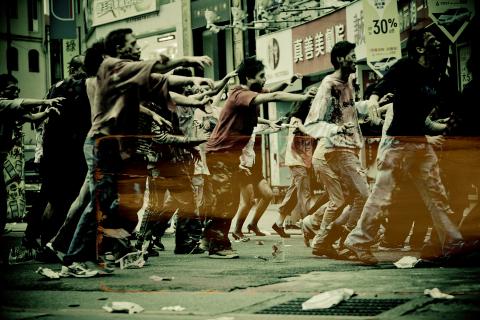Billed as the very first Taiwanese zombie movie, Zombie 108 (棄城Z-108) has generated lots of buzz among horror aficionados both at home and abroad. Nearly 900 people reportedly answered director Joe Chien’s (錢人豪) call to invest in the flick, whose budget clocked in at around NT$10 million. Later, two important players in the genre circuit, the Brussels International Fantastic Film Festival and Puchon International Fantastic Film Festival, picked the movie as part of their lineups this year.
With a more than adequate beginning that recalls many blockbusters of its kind, the self-proclaimed horror B-movie gets off to a good start. Yet the momentum soon dissipates as the movie struggles to flesh out its story.
The film starts with a familiar premise. There is a virus breakout, which is suggested in a sketchy opening sequence. And the next thing we know, Ximending becomes a zombie-infected neighborhood under quarantine. A SWAT team moves in to contain the situation in the seedy downtown area run by local gangs whose obese boss, played by Morris Rong (戎祥), the film’s producer, spends his days surrounded by cocaine and naked women. After a gunfight, the cops and gangsters form an uneasy alliance as they try to survive the flesh-eating undead.

Photo courtesy of Heyshine International
Meanwhile, young mother Linda (Yvonne Yao, 姚采穎) escapes the undead horde with her daughter but falls prey to a pervert, played by director Chien himself, who holds women as sex slaves in his basement.
Eventually, the survivors turn up at the pervert‘s apartment. A Japanese serial killer is thrown in for good measure.
To director Chien’s credit, the zombie assault scenes are well played out. There is also a good deal of gore and blood, though not quite as exciting as many horror fans would expect.

Photo courtesy of Heyshine International
The action sequences are enlivened with parkour and martial arts moves by Taiwanese taekwondo athlete Chu Mu-yen (朱木炎) and martial artist-turned-actor Dennis To (杜宇航) from Hong Kong, both playing SWAT cops. The idea of incorporating extreme sports and kung fu into the fight against zombies has great potential. But the film doesn’t take advantage of this and instead confines itself to a poorly written script revolving around a bevy of mostly dull characters.
The role of women in the zombie action is mostly utilized for torture porn sequences, and the casualness of the sexploitation is hard to stomach.
After making several unsuccessful genre flicks, including Button Man (鈕扣人) and Gangster Rock (混混天團), director Chien seems to be heading in the right direction, into B-movie territory, but he will need to deploy a lot more ingenuity than he shows in Zombie 108 to become a notable filmmaker of trashy movies.

That US assistance was a model for Taiwan’s spectacular development success was early recognized by policymakers and analysts. In a report to the US Congress for the fiscal year 1962, former President John F. Kennedy noted Taiwan’s “rapid economic growth,” was “producing a substantial net gain in living.” Kennedy had a stake in Taiwan’s achievements and the US’ official development assistance (ODA) in general: In September 1961, his entreaty to make the 1960s a “decade of development,” and an accompanying proposal for dedicated legislation to this end, had been formalized by congressional passage of the Foreign Assistance Act. Two

Despite the intense sunshine, we were hardly breaking a sweat as we cruised along the flat, dedicated bike lane, well protected from the heat by a canopy of trees. The electric assist on the bikes likely made a difference, too. Far removed from the bustle and noise of the Taichung traffic, we admired the serene rural scenery, making our way over rivers, alongside rice paddies and through pear orchards. Our route for the day covered two bike paths that connect in Fengyuan District (豐原) and are best done together. The Hou-Feng Bike Path (后豐鐵馬道) runs southward from Houli District (后里) while the

On March 13 President William Lai (賴清德) gave a national security speech noting the 20th year since the passing of China’s Anti-Secession Law (反分裂國家法) in March 2005 that laid the legal groundwork for an invasion of Taiwan. That law, and other subsequent ones, are merely political theater created by the Chinese Communist Party (CCP) to have something to point to so they can claim “we have to do it, it is the law.” The president’s speech was somber and said: “By its actions, China already satisfies the definition of a ‘foreign hostile force’ as provided in the Anti-Infiltration Act, which unlike

Mirror mirror on the wall, what’s the fairest Disney live-action remake of them all? Wait, mirror. Hold on a second. Maybe choosing from the likes of Alice in Wonderland (2010), Mulan (2020) and The Lion King (2019) isn’t such a good idea. Mirror, on second thought, what’s on Netflix? Even the most devoted fans would have to acknowledge that these have not been the most illustrious illustrations of Disney magic. At their best (Pete’s Dragon? Cinderella?) they breathe life into old classics that could use a little updating. At their worst, well, blue Will Smith. Given the rapacious rate of remakes in modern